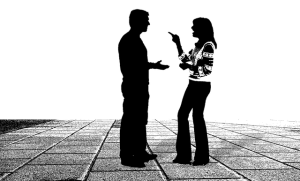that’s the order of the day, that happens frequently
[Dutch phrase of the week]
[dat is sche-ring en in-slag] ![]()
 When you say that something is ‘schering en inslag’, you mean that it happens very frequently and that it is a bad thing. Like people dodging fares, or managers collecting huge bonuses whereas other people can’t pay their mortgage anymore (and the latter could therefore also be ‘schering en inslag’).
When you say that something is ‘schering en inslag’, you mean that it happens very frequently and that it is a bad thing. Like people dodging fares, or managers collecting huge bonuses whereas other people can’t pay their mortgage anymore (and the latter could therefore also be ‘schering en inslag’).
Literally ‘schering en inslag’ translates as ‘warp and weft/woof’.
Examples:
– “Ik zie tegenwoordig steeds meer scooters rijden in de stad, en ze maken een enorme herrie; het is schering en inslag in Amsterdam.”
(“Nowadays I see more and more scooters (riding) in the city, and they make a tremendous amount of noise; it’s the order of the day in Amsterdam.” Note that the noun ‘herrie’ already implies ‘a lot of noise’.)
– “Dat managers extreem hoge bonussen opstrijken ten koste van het gewone personeel is schering en inslag geworden; we spreken nu inmiddels van een ‘graaicultuur’.”
(“It has become almost normal that managers collect big bonuses at the expense of the regular personnel; by now we speak of a ‘groping culture’.” Note that the verb ‘opstrijken’ is used for ‘collecting/receiving without any effort’.)
– “Spelfouten zijn schering en inslag op het internet, maar ook een kwaliteitskrant als NRC Handelsblad maakt zich er schuldig aan.”
(“Spelling errors have become common on the internet, but also a quality newspaper such as ‘NRC Handelsblad’ is guilty of making such errors.” Note the construct ‘zich schuldig maken aan iets’: to be guilty of doing something.)
Expressions:
– “Dat is aan de orde van de dag”: that’s the order of the day. This expression doesn’t have a negative connotation by definition, as opposed to ‘dat is schering en inslag’.
Related words:
– Frequent: frequently [adjective/adverb].
– Normaal: normal [adjective].
Example:
– “Het is tegenwoordig normaal geworden om elkaar niet meer fatsoenlijk te groeten.”
(“These days it has become normal to no longer properly greet / say hello to each other.”)

 “Normaal gesproken” literally translates to “normally spoken”. “Gesproken” is the past participle of the irregular verb “spreken” [sprak, h. gesproken].
“Normaal gesproken” literally translates to “normally spoken”. “Gesproken” is the past participle of the irregular verb “spreken” [sprak, h. gesproken].